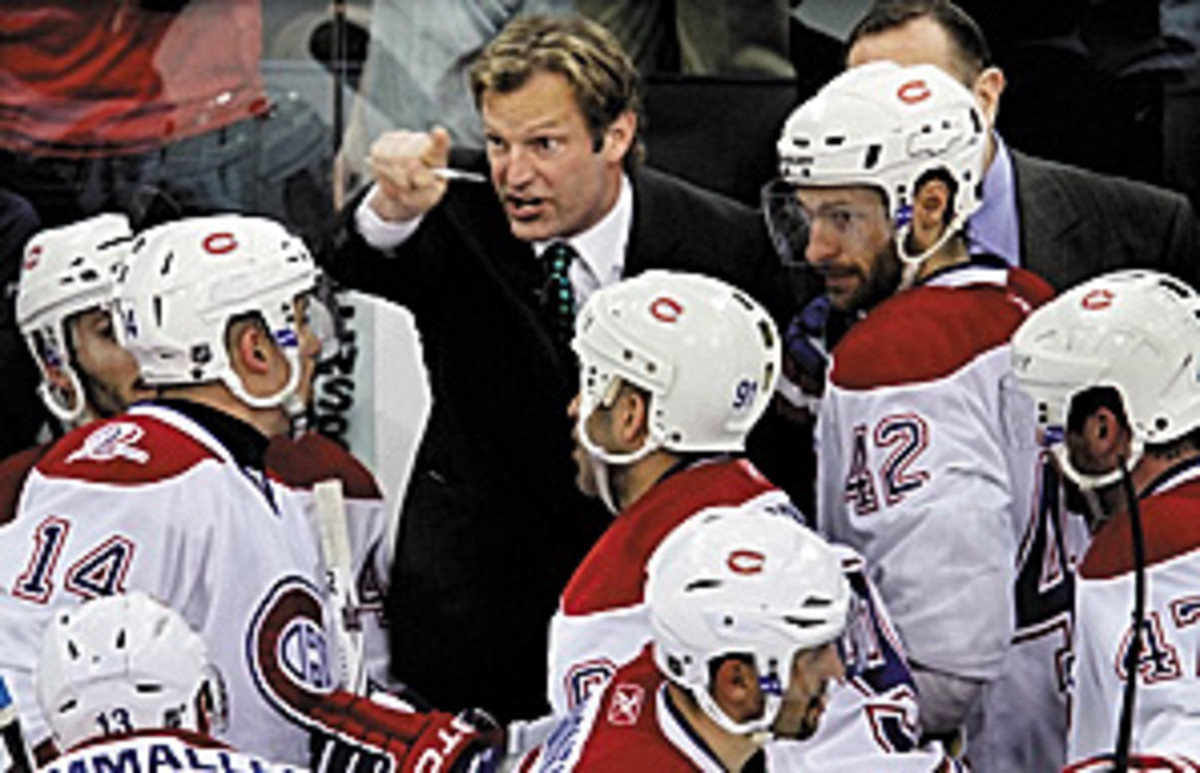Head coach timber sprouts behind the bench during the playoffs
At this time of year, it's hard to take your eyes off the ice, and with good reason. The Eastern Conference has already given us improbable storylines courtesy of Montreal and Philadelphia. Out west, Chicago and San Jose continue to prove worthy of their No. 2 and No. 1 regular season seeding respectively, The Blackhawks and Sharks delivered a breathtaking Game 1, a 2-1 road win for Chicago in which both teams fired at least 40 shots on goal, delivered hard, clean hits, and never stopped skating on offense and defense.
Yet, there is a bevy of activity off the ice as well, with playoff hockey being more about adjustments due to the nature of the series format.
During the regular campaign, a coach and his staff prepare on a game-by-game basis, one opponent after another, but the emphasis is on overall execution by their charges, as well as instilling the details required for consistency over the long haul. Come postseason time, the focus narrows to applying those details in specific situations against targeted personnel on the opposing team. Coaches and their assistants have to manage game-to-game when going head-to-head if the opposition is exploiting one of their tendencies, or if something they thought would work proves to be fruitless.
I bring all this up with the assistant coaches in mind. This is the time of year to make names for themselves. Current Sharks bench boss Todd McLellan took over as head coach in San Jose after serving as an assistant to Mike Babcock in Detroit, culminating with the Red Wings' Stanley Cup in 2008. True, McLellan had vast coaching experience at the junior level before becoming a NHL assistant, but that postseason visibility helped raise his profile further.
McLellan counterpart on the Blackhawks, Joel Quenneville, did essentially the same thing after being an assistant on Colorado's Stanley Cup-winning squad in 1996. He took the St. Louis Blues' head coaching job the following year -- having joined the staff in the offseason -- replacing Mike Keenan. Lindy Ruff followed the same path as an assistant with Florida Panthers' surprise Cup finalist team of 1996 before taking over as the head coach in Buffalo in 1997. Both Quenneville and Ruff are former NHL players who had long careers at the top level before getting into coaching. Both made the jump from assistant to head coach in the NHL without running their own program elsewhere, yet they've proven to be excellent NHL coaches.
All of which brings me to the possibility of another long-standing former NHL player making that leap based on this postseason. I'm referring to Canadiens' assistant coach Kirk Muller. While covering the playoffs this spring, I've noticed Muller's seemingly growing in-game role behind the bench. Head coach Jacques Martin routinely chats with Muller, and when the team gathers at the bench, it is Muller, not Martin, who addresses the players and draws up late-game plays.
This speaks volumes about Martin as a leader and his ability to delegate. It also points to Muller as a rising star in the coaching ranks. Several of the team's tactical changes have sprung from him during the first two rounds of the playoffs, including going with a shorter bench late in the series upset of Washington and changing the neutral zone/defensive zone regroup late in the series against defending Stanley Cup Champion Pittsburgh.
Now, many former players serve as valuable assistants over a long period of time and are happy to do so without ever having designs on the head job. Maybe that's Muller's mindset, but I don't think so.
He has been on the job in Montreal in his current capacity for four seasons after coaching one season of Canadian college hockey at Queens University. Coming back to Montreal, where he was part of their 1993 Stanley Cup-winning team probably seemed like enough back in 2006 when former teammate Guy Carbonneau added him to his staff. Now, though, I get the sense that Mueller wants more. I see it in his body language and I hear it in his voice when he's interviewed on- or off-camera about series details.
With at least three teams looking for a new direction behind the bench for 2010-11, I wonder if they've seen what I've seen. Certainly, the best advertisement for Muller's advancement is the continued success of the Canadiens in the playoffs. For now, though, that means meetings, meetings and more video for Martin and his staff as they look to tweak their approach against the Flyers in Game 2.
A 6-0 drubbing tends to keep all involved in the moment. Whatever the Habs concoct, however, I have a sense that Muller will be in the middle of it.






